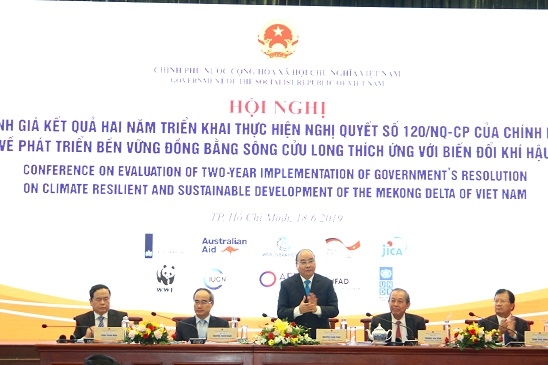Mekong Delta should utilise Industry 4.0 in climate change adaption
 |
| Prime Minister Nguyen Xuan Phuc speaking at the conference |
Speaking at the conference, PM Phuc said that the Mekong Delta region and Ho Chi Minh City are heavily affected by climate change impacts, such as rising tides, floods, and increasing temperature. However, many people are not aware of this challenge. Several businesses are not ready to deal with natural disasters and climate change. The livelihood of about 20 million people in the Mekong Delta region is facing great challenges.
The prime minister said that the Fourth Industrial Revolution has created many achievements and Vietnam should take advantage of these achievements to cope with climate change.
He suggested that it is necessary to mobilise the wisdom of scientists as well as the government and the people under the motto of ‘The government advocates, businesses act, and people respond’.
Accordingly, the government allocates resources, enterprises invest in specific projects to build valuable trademarks, while the people respond by becoming more aware and joining production restructuring activities to adapt to climate change. The prime minister requested that ministries and sectors work with Mekong Delta localities to study suitable planning for rice and fruit cultivation and aquatic farming areas that could help build a production ecosystem and cut costs for businesses.
He urged localities in the region to boost co-operation to cope with climate change. Ho Chi Minh City should be the “conductor” in co-ordinating regional connectivity and pioneer in the implementation of the United Nations (UN) Framework Convention on Climate Change.
The Mekong Delta has played a critical role in Vietnam’s socio-economic successes. Today, the Delta is home to 20 million people and accounts for half of Vietnam’s rice production, 70 per cent of its aquaculture production, and one-third of its GDP. It remains one of the most fertile regions in the world.
The Delta is full of opportunities to further the successes of Vietnam’s development agenda and to spearhead the transformation of the Delta’s economy into one that is more productive, more innovative, and more resilient to climate change.
According to Madhu Raghunath, programme leader for Sustainable Development at the World Bank in Vietnam, unlocking these breakthroughs will require a fundamental shift in the development paradigm for the Mekong Delta – from a farm and provincial perspective to an area-based and inter-provincial, delta-wide, and transboundary one; from a short-term sectoral perspective to a long-term, multisectoral perspective that is based on the principle of working with nature because climate change, greater weather variability, and saline intrusion are the Delta’s new normal. These shifts have been well captured in Resolution 120.
She said, “As Development Partners, we commend the Vietnamese government for having issued Resolution 120 and, earlier this year, approved the Action Plan for Resolution 120. Our support in the Mekong Delta is closely aligned to the shifts and solutions identified in Resolution 120. Development partners are currently actively involved in supporting the central and provincial government on a range of issues.”
“Water is an important area for many development partners and our support has focused on the better management of water resources through investments in irrigation infrastructure, reservoirs, dam rehabilitation, improved groundwater and surface water monitoring, modeling capacity, and water supply and sanitation. We have also worked with key research organisations like the Southern Institute for Water Resources Research (SIWRR) in areas like groundwater usage, water retention, and partnerships with the private sector for using innovative technology for water saving,” she added.
In addition, several development partners are working with provincial authorities, central government, private sector, and research institutes to enhance the productivity of agriculture in the Mekong Delta in an environmentally sustainable manner. This includes helping farmers adopt practices that work with increasingly saline water – such as aquaculture, and also to live with floods, as there are several production systems that are well placed in areas with greater flood retention.
The support in general assists farmers to shift from a three-rice crop to one or two crops that is less dependent on freshwater. Development partners also promote innovation in production systems, information, and knowledge exchange, investments in infrastructure that can assist with the transformations of production systems, support for value addition, and ensure necessary market linkages.
What the stars mean:
★ Poor ★ ★ Promising ★★★ Good ★★★★ Very good ★★★★★ Exceptional
Related Contents
Latest News
More News
- Foreign leaders extend congratulations to Party General Secretary To Lam (January 25, 2026 | 10:01)
- 14th National Party Congress wraps up with success (January 25, 2026 | 09:49)
- Congratulations from VFF Central Committee's int’l partners to 14th National Party Congress (January 25, 2026 | 09:46)
- 14th Party Central Committee unanimously elects To Lam as General Secretary (January 23, 2026 | 16:22)
- Worldwide congratulations underscore confidence in Vietnam’s 14th Party Congress (January 23, 2026 | 09:02)
- Political parties, organisations, int’l friends send congratulations to 14th National Party Congress (January 22, 2026 | 09:33)
- Press release on second working day of 14th National Party Congress (January 22, 2026 | 09:19)
- 14th National Party Congress: Japanese media highlight Vietnam’s growth targets (January 21, 2026 | 09:46)
- 14th National Party Congress: Driving force for Vietnam to continue renewal, innovation, breakthroughs (January 21, 2026 | 09:42)
- Vietnam remains spiritual support for progressive forces: Colombian party leader (January 21, 2026 | 08:00)

 Tag:
Tag:



















 Mobile Version
Mobile Version